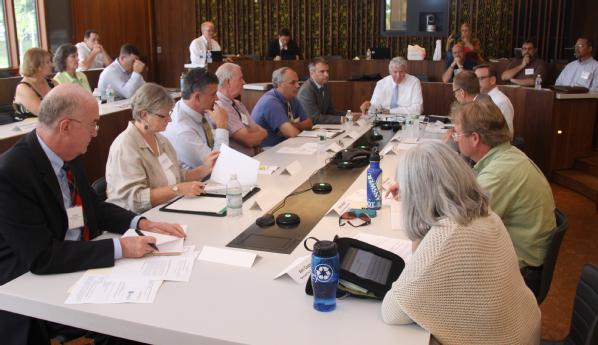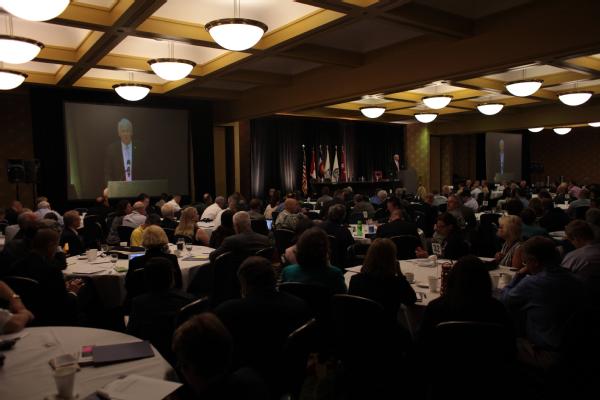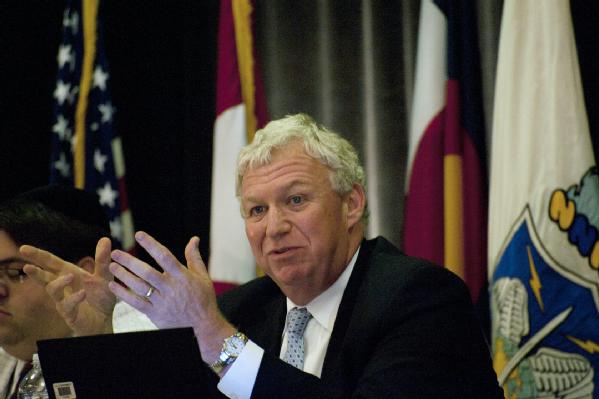Faith-based, Community Organizations & Whole Community Approach to Emergency Management

Bennington, Vt., Aug. 17, 2012 -- FEMA Deputy Director, Richard Serino, (head of table) leads the FEMA Think Tank on the role of faith-based and community organizations in advancing the whole community approach to emergency management.
On August 17, we had a productive conversation about the role of faith-based and community organizations in emergency management. We heard a local story that involved Vermont organizations working together during Hurricane Irene. We heard about the creation of mutually-beneficial partnerships between faith-based, community organizations and emergency managers. And we heard about steps to enhance these existing partnerships.
More than 450 people participated by phone, and a number of participants traveled to Bennington College to join us in Vermont. We all benefitted from an engaging discussion on the whole community approach of faith-based and community organizations as a critical role in emergency management.
We were fortunate to have Max Finberg, senior policy advisor for the White House Office of Faith-based and Neighborhood Partnerships, who offered greetings from the President and the WHOFBNP office. He stressed the importance of faith-based and community organizations in the response phase that came together during Hurricane Irene in his upstate New York hometown of Margaretville, located in the Catskill Mountains.
Working with Faith-based and Community Organizations across Vermont
Our first topic discussed a Vermont story on faith-based and community organizations working together during and following Hurricane Irene. This discussion highlighted the importance of building relationships with different organizations and denominations, including the American Red Cross, AmeriCorps, National Civilian Community Corps, and others. These relationships proved to be important in creating the post-Hurricane Irene Vermont Disaster Relief Fund to assist with long-term recovery assistance as well as a handful of Vermonters to put policies in place to meet unmet needs.
Community businesses also came to the table, including a bakery in Bennington that used social media to articulate community needs. The bakery partnered with the interfaith council to continue to assist the needs of the community. Ultimately, through the long-term recovery, these relationships were critical in focusing on the needs of survivors.
Creating Mutual Beneficial Partnerships between Diverse Faith-based Community Organizations and Emergency Managers
Miami-Dade County’s “Communities Organized to Respond in Emergencies” (CORE) highlighted creating mutually-beneficial partnerships between faith-based organizations and emergency managers. CORE is part of the Department of Homeland Security effort to build resilience within diverse communities. The CORE program includes plans to assist 8,000 survivors after a disaster and expands this partnership to encourage others to reach out to additional partners.
Enhancing Partnerships with Emergency Managers, Faith-based and Community Organizations
Communication is key to enhancing existing partnerships during long-term recovery efforts after a disaster and is necessary to continue to know what organizations are doing to ensure coordinated efforts. Lessons learned included how to enhance existing partnerships, guidelines prior to disasters, and knowing contacts for government and other disaster resources.
The next Think Tank conference call will take place in September during National Preparedness Month. The theme for discussion will be engaging the next generation in public service.
I encourage participants to continue the conversation on the Think Tank Online Forum by sharing and discussing ideas. A full audio and transcript of the August 17 conference call is available at www.fema.gov/fema-think-tank.



